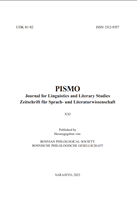Slika ekstaze u Karahasanovom romanu Uvod u lebdenje: od spoznaje božanskog do zaborava sebe
Images of Ecstasy in Dževad Karahasan’s Uvod u Lebdenje: From Knowing God to Forgetting Oneself
Author(s): Almir BašovićSubject(s): Metaphysics, Aesthetics, Bosnian Literature, Theory of Literature, Sociology of Literature
Published by: Bosansko filološko društvo
Keywords: Karahasan; ecstasy; cult; war; opiates; drugs; Menippean satire; shame; witness; mental breakdown; knowledge;
Summary/Abstract: The article discusses the images of ecstasy in the novel Uvod u lebdenje, the last novel by Dževad Karahasan. The experience that Peter Hurd, a poet and great connoisseur of classical Greek culture, undergoes in besieged Sarajevo is treated through a series of images associated with ecstatic cults, but it is also linked to the ecstasy that this poet experiences when under the influence of opiates and drugs. His ecstasy culminates during his visit to Pale, where Peter, together with Serbian soldiers shoots at Sarajevo and goes with a Canadian UNPROFOR general to a house where captive women are being raped. Considering that a year after leaving the besieged city Peter Hurd experiences a complete mental breakdown, conclusions are drawn about the differences between ecstasy within Greek cults and chemically induced contemporary ecstasy. Karahasan’s novel is treated with respect to the characteristics of the Menippean satire, the importance of shame and the role of being a witness, as Karahasan’s important themes. By pointing out the connection of this novel with Plato’s writings, it is shown that through the fate of Peter Hurd, Karahasan has shown that ecstasy in the European culture has undergone a transformation: from the knowledge of the divine towards forgetting oneself.
Journal: Pismo - Časopis za jezik i književnost
- Issue Year: 2023
- Issue No: 21
- Page Range: 83-100
- Page Count: 18
- Language: Bosnian

